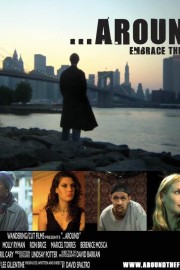…Around
“Figured the best gift I could give you is a blank slate. Now you can fill in whatever you want.”
So says Allyson (Molly Ryman), the love interest of our protagonist Doyle (Rob Evans) in “…Around.” It sounds like just the type of thing you’d hear in any film about self-discovery- which is usually an act of self-reflection on the part of the filmmaker (in this case, independent writer-director David Spaltro)- but at the heart of said statement lies an ultimate truth about life- we are all given a blank slate, and our actions and choices fill in the space.
When the film first started, I was more than a little skeptical. In true conflicted artist form, there’s the typically-narcissistic voiceover of the protagonist which has become a cliche in many such films, though most memorably in “Adaptation.”. In this case, though, it felt less like the self-deprecating wit of Charlie Kaufman’s voice than the self-centered “my poor little life” of Augusten Burrows in “Running With Scissors” (the movie, not the book, which I’ve not read). Other such cliches- like the emotionally-damaging family life (however drolly comic it’s sometimes presented)- rear their heads as well.
But as the film went on, the emotional truth of the story started to emerge from the feeling of self-indulgence that felt prevalent at the start of the film, and the film begins to work on its’ own terms.
As an artist myself, it may seem hypocritical to criticize others of exploring their own narcissism in their art- my own fans will known I’ve indulged in my own over the years, and it’s caused delays in some works that’ve reached “Chinese Democracy” proportions. This is very true, although as a product of studying the arts in an academic setting myself (albeit music, not film), it’s also become very clear how elitist academia can make artists. (It can also make you lose your distinct artistic voice in a way, but that’s for another discussion.) I think where “…Around” lost me at the start was that it felt like a film as patently pretentious and self-important as the one pitched by a film school student in the film. The pitch (and Doyle’s reaction) was obviously intended to be a jab at such films, but in the early moments, this film seemed to be going very much in that direction.
But then the story started to grab me. I started to identify with Doyle’s artistic struggles to find his voice, and his self-reliance and independence- he finds his own ways to get money for school (namely, credit cards…a lot of them), he lives at Penn and Grand Central stations while struggling financially (which makes him an unlikely friend in Saul (Ron Brice), who calls Doyle “Movie Star” while also showing himself unexpectedly well-read)- is something to admire, even if it seems like unnecessary stubbornness when his lonely and hurtful mother (Berenice Mosca) would nonetheless help him if he asked (a bedside interaction near the end reveals things previously unspoken about their relationship). A lot of the philosophies Saul imparts on Doyle about being true to oneself stretch beyond this story and are universal, and hope can be found in the ending, even if it doesn’t take an easy way out, realizing that self-discovery is a longer process than some would like.
“Embrace the Fall”
So says the tagline to “…Around” (which can be read at the beginning of the film, being also the name of the production company Spaltro used to make the film), and again, there’s something universal about such a simple statement. It’s a hard lesson of life that it’s not until we fall that many people start to figure out who they really are, what are core values and ideals are, and who they want to be. You don’t need to be an artist to appreciate the process Doyle goes through in figuring that out. It’s at the moments that illuminate this never-ending process of life where “…Around” really finds its’ voice, and gets to the hard truths its’ protagonist (and Spaltro himself, who based the film on his own experiences studying film in New York) seems to want to get at in his art.
**I would be remiss if I didn’t mention my appreciation for the soundtrack Spaltro compiled for the film, not just the original score by Vita Tanga and Vinny Iannelli but the diverse song soundtrack that reaches far in the musical spectrum- hip hop and college rock share in creating a musical landscape for Doyle’s story- and captures the essence of every moment of the film. It’s a winner, and if you can find any of the tracks available, I’d recommend picking them up. If not, just watch the film again. It’s worth it.










